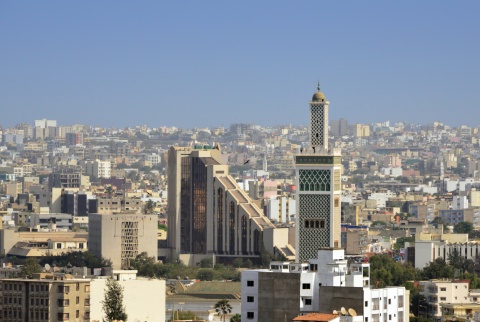Senegal is catching the eye of global employers, and it makes complete sense. Dakar’s growing tech scene, bilingual professionals, and strong connections across West Africa make it a promising place to expand your team.
But then you start looking closer, and it gets a bit complicated.
Hiring in Senegal isn’t just a matter of posting a job and cutting a paycheck. There are specific rules for contracts. Payroll isn’t just payroll—it includes taxes, contributions, line items you probably didn’t even know existed. And if you’re hiring talent from outside the country? That means permits. Paperwork. More layers.
So we made this guide. Not complicated. Just a clear, practical walk-through of how to hire and pay people in Senegal. No drama or surprises. Just what you need to do it right.
Navigating Senegal’s hiring landscape
You have two main options when hiring in Senegal: build your own local entity or work with an employer of record (EOR). If you go the entity route, you’ll register with the Commercial Court, the tax office, and the Social Security Fund (CSS). That gives you maximum control but also means handling cost, time, and compliance risk. If speed and simplicity are your priority, partnering with an EOR means your team is legally employed on your behalf while you direct their day-to-day work.
Here’s a quick checklist to keep things on track:
- Register your business locally or partner with an EOR if you don’t want to establish an entity
- Confirm work permits and residency eligibility for foreign hires
- Draft labor contracts that match Senegalese standards
- Enroll employees in social security and health coverage
- Set up payroll for salaries, benefits, and tax obligations
Understand the essential requirements
Senegal’s Labor Code requires written employment contracts outlining role, pay, benefits, probation, and termination terms. Longer agreements must be registered with the Labor Inspectorate. You also need to register with the CSS and the Retirement Insurance Institution (IPRES). If you prefer a shortcut, EORs handle all of these steps for you.
Assess work permit and residency needs
Foreign staff need a work visa and residence permit from the Ministry of Interior. You’ll submit job offers, proof of qualifications, and a business case showing why the role needs a non-Senegalese hire. These permits are valid for one year and renewable. Temporary authorizations are available for short-term assignments. If this feels complex, lean on a local guide—our work visa guide for Senegal walks you through the process step by step.
Structuring employment contracts and agreements
Think of contracts as the backbone of your employer-employee relationship. In Senegal, they must be written in French and include role, compensation, benefits, probation period (up to three months), and termination policies.
Select contract types
Here’s what works in Senegal:
- Fixed-term contracts (CDD) are ideal for seasonal or project-based roles and must be in writing and submitted to local authorities.
- Indefinite-term contracts (CDI) are the norm for ongoing work and come with regulatory notice and severance requirements.
- Contractors are allowed, but misclassification can lead to penalties. Use them for project-based work and ensure local tax compliance.
Clear contracts prevent confusion and foster trust on both sides.
Setting up efficient payroll and compensation
Payroll is where compliance really shows up. You’ll calculate wages, make required withholdings, and submit contributions on time.
Calculate compensation
As of 2025, Senegal’s minimum wage, the SMIG, is XOF 64,000 (approximately US$114) per month. In sectors like finance, energy, and telecom, pay is typically higher. Salaries are paid in XOF, a currency pegged to the euro and shared across West Africa.
Your payroll calendar should include:
- Salary payments by the last working day each month
- Monthly social security contributions to CSS and IPRES
- Income tax withholdings submitted monthly to Senegal’s tax authority
- Annual returns submitted at year-end
Handle payroll taxes, social security, and employee benefits
In Senegal, employers are in charge of:
- Withholding progressive income tax, which can go up to 40 percent
- Contributing to CSS for family allowances, workplace accidents, and pension funds
- Paying into IPRES
- Providing mandatory health coverage through national programs
Missing deadlines can result in fines. That’s why many companies streamline the process using global compliance strategies.
Navigating benefits, leave, and ongoing compliance
These are important sticking points that can trip up global hires if overlooked:
- Annual leave: 30 days per year, accrued at about 2.5 days per month
- Maternity leave: 14 weeks paid leave, including 8 weeks after childbirth
- Sick leave: Varies by tenure, typically partially paid over time
- Public holidays: 13 recognized national holidays per year
Running a simple quarterly compliance check keeps you ahead of policy changes.
Plan for onboarding, notice periods, and terminations
Onboarding should cover social security registration, reviewing company policies, and confirming contract details. Notice periods range from 15 days to three months depending on responsibility level. Termination requires just cause, and severance may apply, especially under indefinite contracts.
Addressing payment methods and global teams
You’ll need options that work both locally and internationally. These include:
- Local bank transfers in XOF for employees in Senegal
- International transfers for remote or cross-border staff, though fees may apply
- Global payroll platforms that manage compliance and multiple currencies through a single system
Ensure you collect employee ID, job contract, and bank details to process payments smoothly.
Tips and resources for success
Want to make hiring in Senegal smoother? Try this:
- Watch the local Labor Code for updates that could affect your hiring or payroll.
- Keep a payroll calendar with all payment and filing deadlines.
- Track minimum wage changes by sector, which can shift mid-year.
- Work with EOR providers for compliance on contracts, onboarding, payroll, and termination.
An EOR is a trusted partner that legally employs your talent while you manage their roles. EORs handle contracts, taxes, benefits, compliance, payroll, and terminations. It’s the fastest way to hire in Senegal without establishing your own entity. You remain in charge of outcomes; EORs handle the framework.
Build success with confidence, with Pebl
Hiring and paying talent in Senegal is more than just paperwork. It’s about trust and stability. Doing things in a way that says to your employees, “We’ve got you.” That means knowing the rules—really knowing them. And following them. And planning ahead. Which is why this guide includes calendars and checklists—all the stuff that makes the complicated parts a little less complicated.
Because global hiring? It doesn’t have to be overwhelming.
Which is where Pebl comes in. Our Employer of Record (EOR) service lets businesses do this the right way, hiring across borders without losing sleep over tax codes or labor laws. Whether it’s setting up contracts in Dakar, running payroll across currencies, or staying up to speed on compliance in Senegal, we handle the fine print. And you? You focus on what really matters: building a team and reaching your goals.
Reach out today to learn more.
This information does not, and is not intended to, constitute legal or tax advice and is for general informational purposes only. The intent of this document is solely to provide general and preliminary information for private use. Do not rely on it as an alternative to legal, financial, taxation, or accountancy advice from an appropriately qualified professional. The content in this guide is provided “as is,” and no representations are made that the content is error-free.
© 2025 Pebl, LLC. All rights reserved.
Topic:
Country Guides


